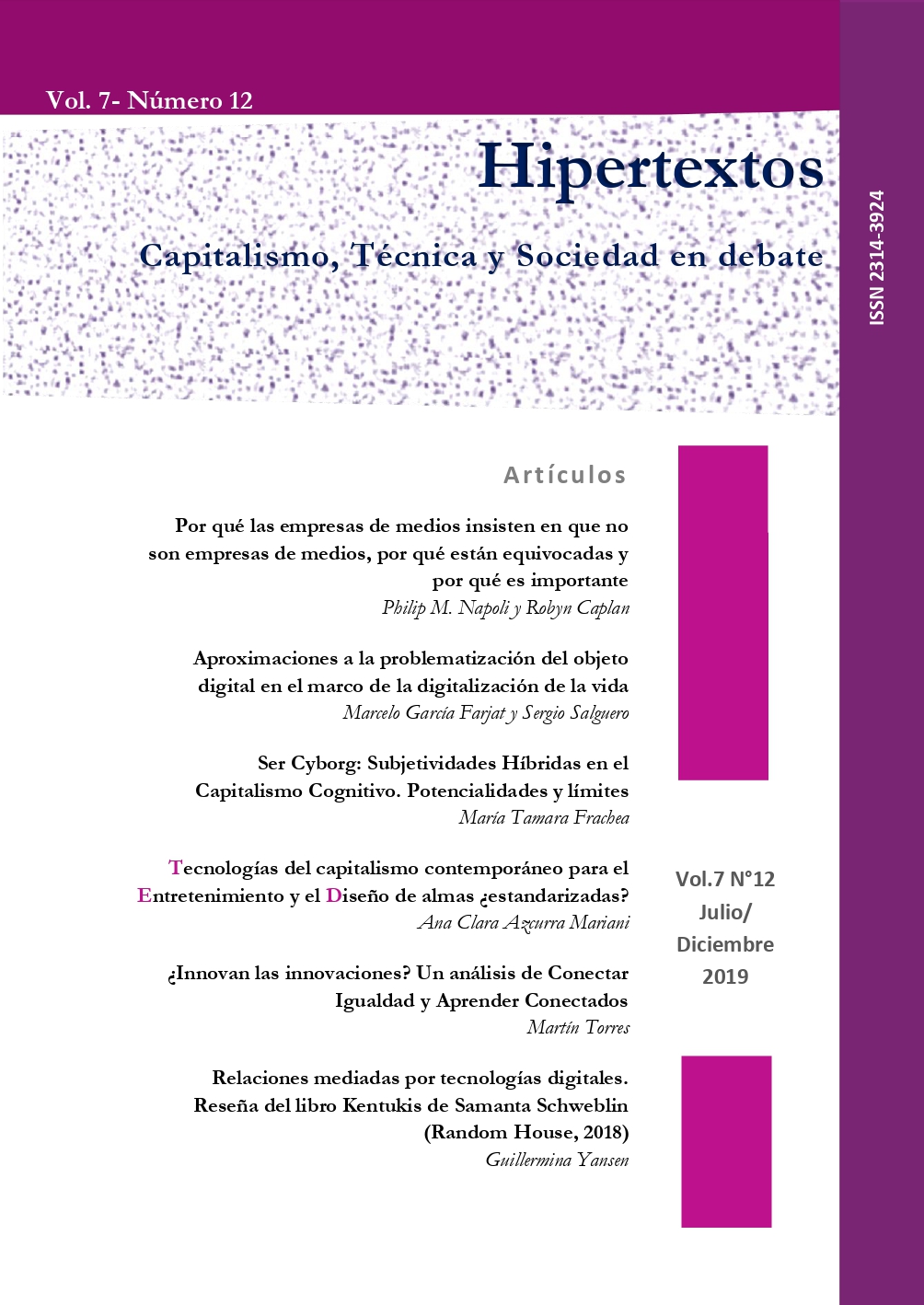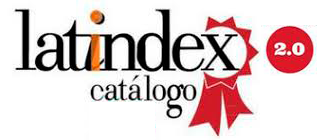Why media companies insist they’re not media companies, why they’re wrong, and why it matters
DOI:
https://doi.org/10.24215/23143924e002Keywords:
Mass media, Social networks, Tech companies, Digital technologies, Communication policiesAbstract
A common position amongst social media platforms and online content aggregators is their resistance to being characterized as media companies. Rather, companies such as Google, Facebook, and Twitter have regularly insisted that they should be thought of purely as technology companies. This paper critiques the position that these platforms are technology companies rather than media companies, explores the underlying rationales, and considers the political, legal, and policy implications associated with accepting or rejecting this position. As this paper illustrates, this is no mere semantic distinction, given the history of the precise classification of communications technologies and services having profound ramifications for how these technologies and services are considered by policy-makers and the courts.
Downloads
References
Bell, E. (2016, 7 de marzo). Facebook is eating the world. Columbia Journalism Review. Recuperado de http://www.cjr.org/analysis/facebook_and_media.php
Benton, J. (2014, 11 de Agosto). Elizabeth Spiers on Buzzfeed and other ‘tech’ companies: “‘You’re still a media company’. Nieman Lab. Recuperado de http://www.niemanlab.org/2014/08/elizabeth-spiers-on-buzzfeed-and-other-tech-companies-youre-still-a-media-company/
Bhattacharyya, S. (2016, 26 de octubre). Digital ads to overtake traditional ads in U.S. local markets by 2018. Advertising Age. Recuperado de http://adage.com/article/cmo-strategy/local-ads-digital-2018-bia-kelsey/306468/
BIA/Kelsey (2005, 4 de abril). Google 10-K: ‘We’re a media company,’ and other tidbits. BIA Advisory Services. Recuperado de http://blog.biakelsey.com/index.php/2005/04/04/google-10-k-were-a-media-company-and-other-tidbits/
Bilton, N. (2012, 25 de julio). Is Twitter a media company or a technology company?. New York Times. Recuperado de http://bits.blogs.nytimes.com/2012/07/25/is-twitter-a-media-or-technology-company/
Bogust, I. (2016, 3 de Agosto). Facebook is not a technology company. Atlantic. Recuperado de http://www.theatlantic.com/technology/archive/2016/08/facebook-is-not-a-technology-company/494183/
Bond, P. (2007, 28 de septiembre). Fresh Facebook draws attention. Hollywood Reporter. Recuperado de http://www.hollywoodreporter.com/news/fresh-facebook-draws-attention-151237
Caplan, R. (2016, 17 de mayo). Like it or not, Facebook is now a media company. New York Times. Recuperado de http://www.nytimes.com/roomfordebate/2016/05/17/is-facebook-saving-journalism-or-ruining-it/like-it-or-not-facebook-is-now-a-media-company
Carney, M. (2015, 20 de febrero). As Uber fights to maintain its technology company classification in India, the rest of the world watches. Pando. Recuperado de https://pando.com/2015/02/20/as-uber-fights-to-maintain-its-technology-company-classification-in-india-the-rest-of-the-world-watches/
Constine, J. (2016, 21 de diciembre). Zuckerberg implies Facebook is a media company, just ’not a traditional media company’ TechCrunch. Recuperado de https://techcrunch.com/2016/12/21/fbonc
Constine, J. (2015, 12 de mayo). Facebook starts hosting publishers’ ‘instant articles’. TechCrunch. Recuperado de https://techcrunch.com/2015/05/12/facebook-instant-articles/
Cukier, J. (2016, 1 de marzo). Why is Uber considered a technology company and a lot of people place it among tech giants like Google, Facebook, etc?. Quora . Recuperado de https://www.quora.com/Why-is-Uber-considered-a-technology-company-and-a-lot-of-people-place-it-among-tech-giants-like-Google-Facebook-etc
Curtin, M.; Holt, J y Sanson, K (eds.) (2014). Distribution revolution: Conversations about the digital future of film and television. Berkeley: University of California Press.
Deuze, M. (2007). Media work. Cambridge: Polity Press.
DeVito, M. (2016). From editors to algorithms: A values-based approach to understanding story selection in the Facebook news feed. Digital Journalism 5 (6), 1–21. DOI http://dx.doi.org/10.1080/21670811.2016.1178592
Dixon, C. (2014, 10 de agosto). BuzzFeed. CDixon Blog. Recuperado de http://cdixon.org/2014/08/10/buzzfeed/
D’Onfro, J. (2016, 29 de agosto). Facebook is telling the world it’s not a media company, but it might be too late. Business Insider. Recuperado de http://www.businessinsider.com/mark-zuckerberg-on-facebook-being-a-media-company-2016-8
Dougherty, C y Steel, E. (2015, 21 de octubre). YouTube introduces YouTube Red, a subscription service. New York Times. Recuperado de https://www.nytimes.com/2015/10/22/technology/youtube-introduces-youtube-red-a-subscription-service.html
Etherington, D. (2016, 14 de diciembre). Facebook exploring creation of its own content. TechCrunch. Recuperado de https://techcrunch.com/2016/12/14/facebook-exploring-creation-of-its-own-original-video-content/
Fiegerman, S. (2016, 15 de junio). Dear Facebook, you’re a media company now. Start acting like one. Mashable. Recuperado de http://mashable.com/2016/05/15/facebook-media-company/
Fiveash, K. (2016, 20 de agosto). ‘We’re a tech company not a media company,’ says Facebook founder. Ars Technica. Recuperado de https://arstechnica.com/tech-policy/2016/08/germany-facebook-edit-hateful-posts-zuckerberg-says-not-media-empire/
Foremski, T. (2004, 11 de diciembre). Stuff you didn’t know about Google — A report from the Googleplex Xmas party. SiliconValleyWatcher. Recuperado de http://www.siliconvalleywatcher.com/mediawatch/archives/2004/12/stuff_you_didnt.php
Fox, J. (2014, 13 de agosto). Why it’s good to be a ‘technology company’. Harvard Business Review. Recuperado de https://hbr.org/2014/08/why-its-good-to-be-a-technology-company/
Gillespie, T. (en prensa). Regulation of and by platforms. En Burgess, J., Poell, T. y Marwick, A. (eds). Sage handbook of social media. Thousand Oaks, Calif.: SAGE. Recuperado de https://www.microsoft.com/en-us/research/wp-content/uploads/2016/12/Gillespie-Regulation-ofby-Platforms-PREPRINT.pdf
Gillespie, T. (2017). Algorithmically recognizable: Santorum’s Google problem and Google’s Santorum problem. Information, Communication & Society, 20 (1), 63–80. DOI http://dx.doi.org/10.1080/1369118X.2016.1199721
Gillespie, T. (2010). The politics of ‘platforms’. New Media & Society, 12 (3). 347–364. DOI http://dx.doi.org/10.1177/1461444809342738,
Gottfried, J. y Shearer, E. (2016, 26 de mayo). News use across social media platforms 2016. Pew Research Center. Recuperado de http://www.journalism.org/2016/05/26/news-use-across-social-media-platforms-2016/
Guynn, J. (2016, 16 de noviembre). Twitter suspends alt right accounts. USA Today. Recuperado de http://www.usatoday.com/story/tech/news/2016/11/15/twitter-suspends-alt-right -accounts/93943194/
Helft, M. (2008, 10 de agosto). Is Google a media company?. New York Times. Recuperado de http://www.nytimes.com/2008/08/11/technology/11google.html
Hess, T. (2014). What is a media company? A reconceptualization for the online world. International Journal on Media Management 16 (1). 3–8. DOI http://dx.doi.org/10.1080/14241277.2014.906993
Ingram, M. (2012, 16 de mayo). Facebook’s biggest problem is that it’s a media company. Gigaom. Recuperado de https://gigaom.com/2012/05/16/facebooks-biggest-problem-is-that-its-a-media-company/
Isaac, M. (2017, 11 de enero). Facebook, nodding to its role in media, starts a journalism project. New York Times. Recuperado de https://www.nytimes.com/2017/01/11/technology/facebook-journalism-project.html
Isaac, M. (2016, 12 de mayo). Facebook, facing bias claims, shows how editors and algorithms guide news. New York Times. Recuperado de http://www.nytimes.com/2016/05/13/technology/facebook-guidelines-trending-topics.html
Jarvis, J. (2016, 11 de mayo). Facebook needs an editor. Medium. Recuperado de https://medium.com/whither-news/facebook-needs-an-editor-b388f789a9c3
Kafka, P. (2014, 11 de agosto). How Jonah Peretti and BuzzFeed got to 850 million. Recode . Recuperado de http://www.recode.net/2014/8/11/11629746/how-jonah-peretti-and-buzzfeed-got-to-850-million.
Kitchin, R. (2017). Thinking critically about and researching algorithms. Information, Communication & Society 20 (1). 14–29. DOI http://dx.doi.org/10.1080/1369118X.2016.1154087.
Koetsier, J. (2012, 22 de agosto). Exclusive: Cheezburger will take page out of Reddit’s playbook, allow users to create own subsites. Venturebeat. Recuperado de http://venturebeat.com/2012/08/22/exclusive-cheezburger-will-take-page-out-of-reddits-playbook-allow-users-to-create-own-subsites/
Kokalitcheva, K. (2016, 10 de febrero). YouTube’s first lineup of original content is here. Fortune. Recuperado de http://fortune.com/2016/02/10/youtube-originals-release/
Kramer, S. D. (2006, 12 de junio). Google is still a tech company. Really. Gigaom. Recuperado de https://gigaom.com/2006/06/12/google-is-still-a-tech-company-really/
Langer, A. (2003, 10 de septiembre). Is Steve Jobs the god of music? Esquire. Recuperado de http://www.esquire.com/news-politics/a11177/steve-jobs-esquire-interview-0703/
Lentz, R. (2013). Excavating historicity in the U.S. network neutrality debate: An interpretive perspective on policy change. Communication, Culture, & Critique 6 (5). 568–597. DOI http://dx.doi.org/10.1111/cccr.12033
Lentz, R. (2011). Regulation as linguistic engineering. En Mansell, R. y Raboy, M. (eds). Handbook of global media and communication policy. New York: Blackwell 432–448. DOI http://dx.doi.org/10.1002/9781444395433.ch27
Manjoo, F. (2016, 11 de mayo). Facebook’s bias is built-in, and bears watching. New York Times. Recuperado de http://www.nytimes.com/2016/05/12/technology/facebooks-bias-is-built-in-and-bears-watching.html,
Gunther McGrath, R. (2015, 10 de enero). 15 years later, lessons from the failed AOL-Time Warner merger. Fortune. Recuperado de http://fortune.com/2015/01/10/15-years-later-lessons-from-the-failed-aol-time-warner-merger/
Mickey, B. (2013, 29 de octubre). Are you a technology company or a media company? Folio. Recuperado de http://www.foliomag.com/are-you-technology-company-or-media-company/
Morrissey, B. (2016, 6 de mayo). BuzzFeed’s Dao Nguyen: ‘We don’t think of ourselves as an island’. Digiday. Recuperado de http://digiday.com/publishers/buzzfeed-dao-nguyen-digiday-podcast/
Nadler, A. M. (2016). Making the news popular: Mobilizing U.S. news audiences. Champaign: University of Illinois Press.
Napoli, P. M. (2016). Requiem for the long tail: Towards a political economy of content aggregation and fragmentation. International Journal of Media & Cultural Politics 12 (3). 341–356.
DOI http://dx.doi.org/10.1386/macp.12.3.341_1.
Napoli, P. N. (2015). Social media and the public interest: Governance of news platforms in the realm of individual and algorithmic gatekeepers. Telecommunications Policy 39 (9). 751–760. DOI http://doi.org/10.1016/j.telpol.2014.12.003
Napoli, P. N. (2011). Audience evolution: New technologies and the transformation of media audiences. New York: Columbia University Press.
Napoli, P. N. (2008). Bridging cultural policy and media policy. Journal of Arts Management, Law, and Society 37 (4). 311–322. DOI http://dx.doi.org/10.3200/JAML.47.4.311-332
Napoli, P. N. (2001). Foundations of communications policy: Principles and process in the regulation of electronic media. Cresskill, NJ: Hampton Press.
Napoli, P. N. y Caplan, R. (2016). When media companies insist they’re not media companies and why it matters for communications policy. Ponencia presentada en la Telecommunications Policy Research Conference (Arlington, Va.). Recuperado de http://dukespace.lib.duke.edu/dspace/handle/10161/13897.
New York v. Harris, 2012. 36 Misc. 3d 868; 949 N.Y.S.2d 590; 2012 N.Y. Misc. LEXIS 3076; 2012 NY Slip Op 22175. Ver también https://www.eff.org/cases/new-york-v-harris.
Nunez, M. (2016a, 9 de mayo). Former Facebook workers: We routinely suppressed conservative news. Gizmodo. Recuperado de http://gizmodo.com/former-facebook-workers-we-routinely-suppressed-conser-1775461006,
Nunez, M. (2016b, 3 de mayo). Want to know what Facebook really thinks of journalists? Here’s what happened when it hired some. Gizmodo. Recuperado de http://gizmodo.com/want-to-know-what-facebook-really-thinks-of-journalists-1773916117
Pasquale, F. (2015). The black box society: The secret algorithms that control money and information. Cambridge, Mass.: Harvard University Press.
Patel, N. (2014, 15 de enero). The wrong words: How the FCC lost net neutrality and could kill the Internet. The Verge. Recuperado de http://www.theverge.com/2014/1/15/5311948/net-neutrality-and-the-death-of-the-internet
Picard, R. (2011). The economics and financing of media companies. Segunda edición. New York: Fordham University Press.
Perez, S. y Shieber, J. (2017, 27 de febrero). YouTube Unveils YouTube TV, its live TV streaming service. TechCrunch. Recuperado de https://techcrunch.com/2017/02/28/youtube-launches-youtube-tv-its-live-tv-streaming-service/
Pierson, D. y Dave, P. (2016, 31 de mayo). If Facebook promotes propaganda, can it be a neutral news platform? Los Angeles Times. Recuperado de http://www.latimes.com/business/la-fi-tn-eu-tech-20160531-snap-story.html
Raboy, M. y Landry, N. (2005). Civil society, communication, and global governance: Issues from the World Summit on the Information Society. New York: Peter Lang.
Rana, S. (2012, 12 de julio). Is Twitter a technology platform, a media company — or both? Tech2. Recuperado de http://tech.firstpost.com/news-analysis/is-twitter-a-technology-platform-a-media-company-or-both-29998.html
Rinehart, W. (2015). A semantic network analysis of the network neutrality debate. Ponencia presentada en la Research Conference on Communication, Information and Internet Policy. Recuperado de https://tprc2015.sched.com/event/3v9Q/a-semantic-network-analysis-of-the-network-neutrality-debate
Robinson, J. (2016, 23 de noviembre). Merkel vows to regulate ‘fake news’ after blaming social media for the rise of populist politics and ‘making it harder to form people’s opinions than it was 25 years ago’. Daily Mail . Recuperado de http://www.dailymail.co.uk/news/article-3964366/Merkel-vows-regulate-fake-news-blaming-social-media-rise-populist-politics-making-harder-form-people-s-opinions-25-years-ago.html
Roberts, J. J. (2016, 14 de noviembre). Why Facebook won’t admit it’s a media company. Fortune. Recuperado de http://fortune.com/2016/11/14/facebook-zuckerberg-media/
Ruane, K. A. (2011, 13 de julio). Fairness Doctrine: History and constitutional issues. Congressional Research Service. Recuperado de https://www.fas.org/sgp/crs/misc/R40009.pdf

























